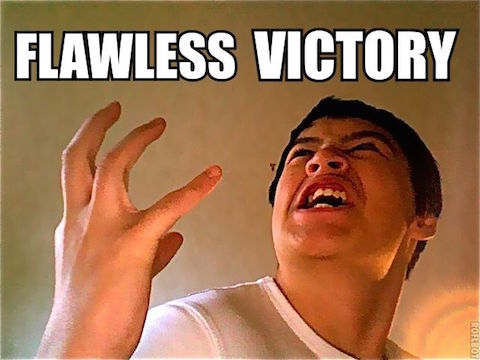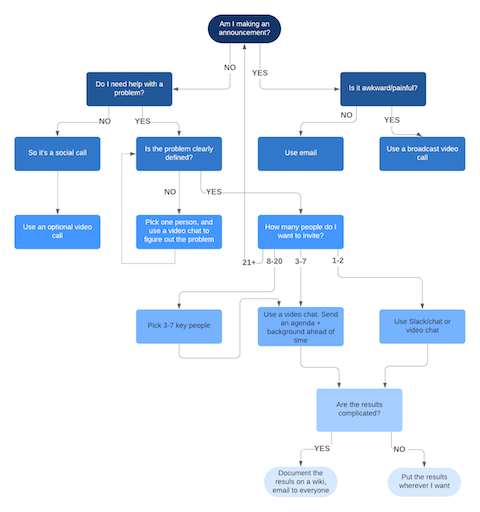Working From Home
31 August 2020
COVID-19 changed the world. It has started a Pandemic Depression.
I’m fortunate to have a job, one I can do from home. I’ve made changes to work remotely until 2022:
- Build a routine that suits me
- Use the right tools
- Do one thing at a time
Work
I build infrastructure and pipelines to do computational biology, mostly single-cell genomics. It’s messy, so constant communication is key to getting anything done.
I work in a great team. Communication is the critical skill. Covid-19 has scrambled the foundation of my job, working with colleagues.
- No serendipity - The most productive conversations are organic. I.e. chatting over lunch, after a meeting, or in a hallway.
- Harder to Trust - There’s a bond of familiarity and trust that builds when you work with someone. Creating, and maintaining, bonds is far harder over text or video.
- Complexity of Life - Everyone is busy with the unexpected: home schooling, money worries, health concerns, family struggles. It is impossible to sustain typical productivity right now.
Remote engineering is a difficult endeavor, requiring careful skills and clever dynamics.
As a result, I’ve made changes to the way I work. I make a conscious effort to connect with colleagues. I talk about more than work during video meetings. I remember that we are all in this together.
Building new habits is critical. Little rituals can become touchstones. A daily email check-in. Video scrum. Virtual happy hour. Silly Hat Day. Many of us are creatures of habits; new routines will persist.
Communication Tools
Different tools solve different problems. I choose tools to suit the problem at hand.

Focus
My job is to solve problems. Though I’m balancing different issues every day, I can solve only one problem at a time. I have to focus.
I have synthesized different approaches into my own method for getting things done…
Dev’s 83 Minute Cycle
- Get Settled
- Mute my phone, put it in my pocket, and say I’m busy on Slack
- Close my eyes, and take 5 deep breaths
- Start a 65-minute timer - My ideal pomodoro time is about 65-70 minutes
- Put on quiet background sound. This works better than music.
- Framing
- Stand up, and close my eyes
- Use pen + paper to figure out the problem to solve.
- What question needs answers first?
- What’s the simplest, clearest framing of that question?
- How do I answer that question using tiny steps?
- Do Work
- Do each tiny step, until I can answer my small question.
- Use paper to figure out the next small question I need to answer.
- Repeat until I’m done, or the timer goes off.
- Wind Down
- Write down key lessons
- Stand up, stretch
- Take a 10-minute break. Walk outside.
- Reply to messages on my phone, email, or Slack
…and repeat
Tools
Process is important. Software engineering is a craft. I learn by doing, & am only as good as my tools and technique. My tools are a keyboard, a screen, a terminal window, a text editor, and web browser. One tool, however solves most problems:

Example - Performance Tuning
Last week I was speeding up some slow genome annotation code. It was analyzing 14K cells, with each cell expressing potentially 33K+ genes. The code processed cells one by one, with each cell taking 5 seconds. That’s a 19 hour runtime.

The code needed to be faster. That’s the simplest version of the problem. I wrote down a few ideas for solving it. I checked my personal knowledgebase for useful notes.
Then I did performance profiling:
Looks like set intersection is the bottleneck. I optimized that bit of the code:
This reduced the runtime to .89s per cell (3.5 hours total). Next, I added parallelism:
With 8 threads, the runtime dropped to 27 minutes, a 42X speedup. With 32 threads, the runtime dropped to 17 minutes, a 67X speedup. I’m content with that.

Solo Work
I usually solve problems alone. When the covid-19 lockdowns started, I didn’t appreciate its full impact. I could theoretically do everything at home.
The first challenge: I am a creature of habit. I was flailing during the first few WFH weeks, building a new routine.
After weeks of experimenting, I identified a good routine, to build new habits. Changing my environment, rather than relying on willpower, is key.
My new routine:
- Wake up when I want to (early)
- Log into my work computer. I use it for all work, and only work.
- (A separate username/profile does much the same)
- Drink tea and get organized
- Work in 83-minute cycles until I’m done.
- Go outside for 20 minutes, to transition away from work
- Do anything else to relax
- Prep for tomorrow
- Get plenty of sleep
I try to avoid counterproductive behaviors:
- Working sleep deprived
- Working at night
- Attending meetings without enough prep
- Thinking on a full stomach
- Relying on willpower/grit over environmental influence
- Working more than 40 hours a week
- Doing more than 1 thing at once.
- Battling one problem for too long. If I’m stuck, I should stop, and come back later.
- Doing too much
- Using Facebook
- Focusing on time, and not goals, or results
- Estimating how long anything will take
One key decision was picking working hours and transition behaviors. I have a morning routine to get oriented for work: tea, deep breathing, and writing down my plan for the workday.
At the end of the day, I go for a walk, and do nothing but breathe, and absorb sunlight. I’m mentally ‘put away’ my thoughts about work.
Bad boundaries between work and personal time is a foolproof way to ruin your quality of life. When I do have bad boundaries, I can’t focus on my work, my partner, my hobbies, or anything else. It causes problems.
Work Technology
Software engineering is a physical, human process. Nothing we do is ephemeral.
I’ve replicated aspects of work at home. Let’s start with the physical.
Ergonomics
It’s unhealthy to sit for long periods. If you must do this, body mechanics are crucial.
- Sitting - I use a kneeling chair. It took me a couple of weeks to adjust. It helps.
- Display - I love a large screen; I can keep open 3 terminals, 2 editors, a web browser, and my wiki. You can get a high-quality 42”, 3840x2160 display for $240. I love mine.
- Input - I use an ergonomic keyboard and a wireless mouse. I spend a few minutes each day practicing keyboard shortcuts. I’m faster and healthier when I use the keyboard for everything.
- Cold Water - I do better when I drink water. I have an array of water bottles in the fridge, making it easy to drink ~3 liters a day.
I have effective technology tricks:
- Sound - A good pair of headphones is heavenly. I can’t tell you how much easier it is to work with background sound. I use a $40 pair of Bluetooth headphones.
- Backups - I use cloud storage, spinning rust, and the 3-2-1 method to back up my data.
- Fast Internet - This is the hardest bit, because I very little control. My two options for Internet are 3Mbps DSL (🤢) or
Comcastthe local cable monopoly. (Side note - why isn’t there an instruction manual on how to create a small ISP? I’d start one for my city if I knew how) - A Duck - I solve a lot of problems by Talking to the Duck. It’s hard to do with no coworkers around, so I use paper, and mutter out loud. I don’t resemble a madman at all, no sir.
As I’m writing this, I’m reminded of a common machine learning error: overfitting. By tuning my actions to specific circumstances, I am not prepared for the unexpected. That’s a thought for another day.
Privilege

The title of this post should have been “First World Optimizations”, not “Working From Home”.
I am very aware that I’m lucky, and privileged, to be in this position. Several months into the Pandemic Depression, and I still have a stable job. I can do my job from home, and have the space to do it. I can be physically distant. I can afford to go into shared indoor spaces (grocery stores) for <20 minutes a week. My community and local government take reasonable covid-19 precautions (masks, social distancing). My neighborhood has a low rate of spread.
I am in this place in part because of privileges I didn’t earn. I grew up in a neighborhood with good schools teachers. My home life was stable enough for me to focus on my education. My childhood interest happens to align with a lucrative career. I have inherent privileges because of my gender. So, all that I’ve written about doesn’t amount to much, because it’s not about our civil society.
My next post is about supporting one another. Until then, I hope you, your friends, family, and community, are surviving and coping. We live in trying times, and we are all connected.





